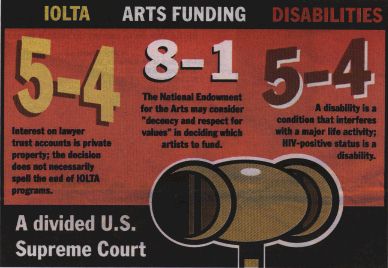|
|
|
Judge faces discipline for opinion
Commission charge unleashes protest in legal community |
 |
By NANCY McCARTHY
Staff Writer |
 |
| The Commission on Judicial
Performance’s charges of misconduct last month against an appellate judge for a
dissent he published unleashed a firestorm of protest from judges, attorneys and lawmakers
throughout the state. The discipline case against Justice J. Anthony Kline even prompted
a rare rebuke by the American Bar Association, which urged the commission to drop its
investigation.
 Those who have rushed to Kline’s defense worry about judicial
independence and the chilling effect potential disciplinary action poses on judges as they
write decisions. They accuse the commission of overstepping its bounds in charging
misconduct in a case which does not involve corruption or dishonesty. Those who have rushed to Kline’s defense worry about judicial
independence and the chilling effect potential disciplinary action poses on judges as they
write decisions. They accuse the commission of overstepping its bounds in charging
misconduct in a case which does not involve corruption or dishonesty.
“I think probably everybody’s a little nervous, not knowing how far the
commission wants to push this,” said J. Clark Kelso, a professor at McGeorge School
of Law. “This clearly has the potential, and in some cases probably already has had,
a real chilling effect on an appellate judge who may be considering or writing concurring
or dissenting opinions.”
Unprecedented action
In its unprecedented action, the commission accused Kline, presiding justice of the 1st
District Court of Appeal in San Francisco, of |
See JUDGE FACES DISCIPLINE |
|
| An unusual Supreme Court term |
 |
| By ERWIN CHEMERINSKY |
 |
 The Supreme Court term which just ended
is one of the most unusual in recent memory. There were fewer major constitutional rulings
than in any term in years. There were no cases dealing with the religion clauses or
federalism or the scope of Congress’ powers or equal protection. The Supreme Court term which just ended
is one of the most unusual in recent memory. There were fewer major constitutional rulings
than in any term in years. There were no cases dealing with the religion clauses or
federalism or the scope of Congress’ powers or equal protection.Yet, it would be a
mistake to dismiss the term as unimportant because there were several significant rulings
concerning the meaning of federal civil rights laws.
Even more surprising, the term was less consistently ideologically conservative than
probably any other in the 1990s. For example, in the last two days of the
term--traditionally the time when many of the most significant rulings are
announced--Justice Antonin Scalia dissented six times.
As usual, there were several important rulings decided by 5-4 margins in which the
majority was the conservative coalition of Chief Justice William H. Rehnquist and Justices
Scalia, Sandra Day O’Connor, Anthony M. Kennedy and Clarence Thomas.
 But
there also were notable 5-4 decisions in which Justices John Paul Stevens, David H.
Souter, Ruth Bader Ginsburg and Stephen G. Breyer were able to join with Justice Kennedy,
and in one instance Justice Thomas, to produce a more moderate result. But
there also were notable 5-4 decisions in which Justices John Paul Stevens, David H.
Souter, Ruth Bader Ginsburg and Stephen G. Breyer were able to join with Justice Kennedy,
and in one instance Justice Thomas, to produce a more moderate result.
IOLTA
In constitutional rulings, one of the most important decisions of the term was Phillips
v. Washington Legal Foundation. The issue was constitutionality of state Interest on
Lawyer Trust Account (IOLTA) programs. |
See SUPREME COURT TERM |
|
Advisory - Because
of the bar layoffs, some of the phone numbers listed in the Guide to the State Bar
will now be answered by a recording. The self funding California Bar Journal will continue
to publish on its regularly monthly basis. |
|
| Annual Meeting in Monterey Oct. 1-4 |
 |
| Caught in a dilemma of major
cutbacks and operating with a skeletal staff, the State Bar is forging ahead with its
planned Annual Meeting in Monterey October 1-4. To cancel the annual convention, which
must be scheduled several years in advance, the bar faced penalty fees of $420,000. Some
events which in previous years were free will cost participants the price of a ticket this
year. No bar membership dues will be used to fund any of the activities, and the entire
meeting is expected to pay for itself, said bar meeting organizer Pam Wilson.
As usual, participants can earn up to 22 hours of minimum continuing legal education
(MCLE) credit by choosing from the 100-plus courses offered. Topics cover a wide array of
practice areas, as well as issues such as technology, time management, writing skills,
fees, avoiding stress and how to make an effective presentation.
Featured speakers include NBC legal correspondent Jack Ford, Stuart Varney, a founding
member of CNN’s business team, and Detroit Mayor and former Michigan Supreme Court
Justice Dennis W. Archer. |
See ANNUAL MEETING |
|

